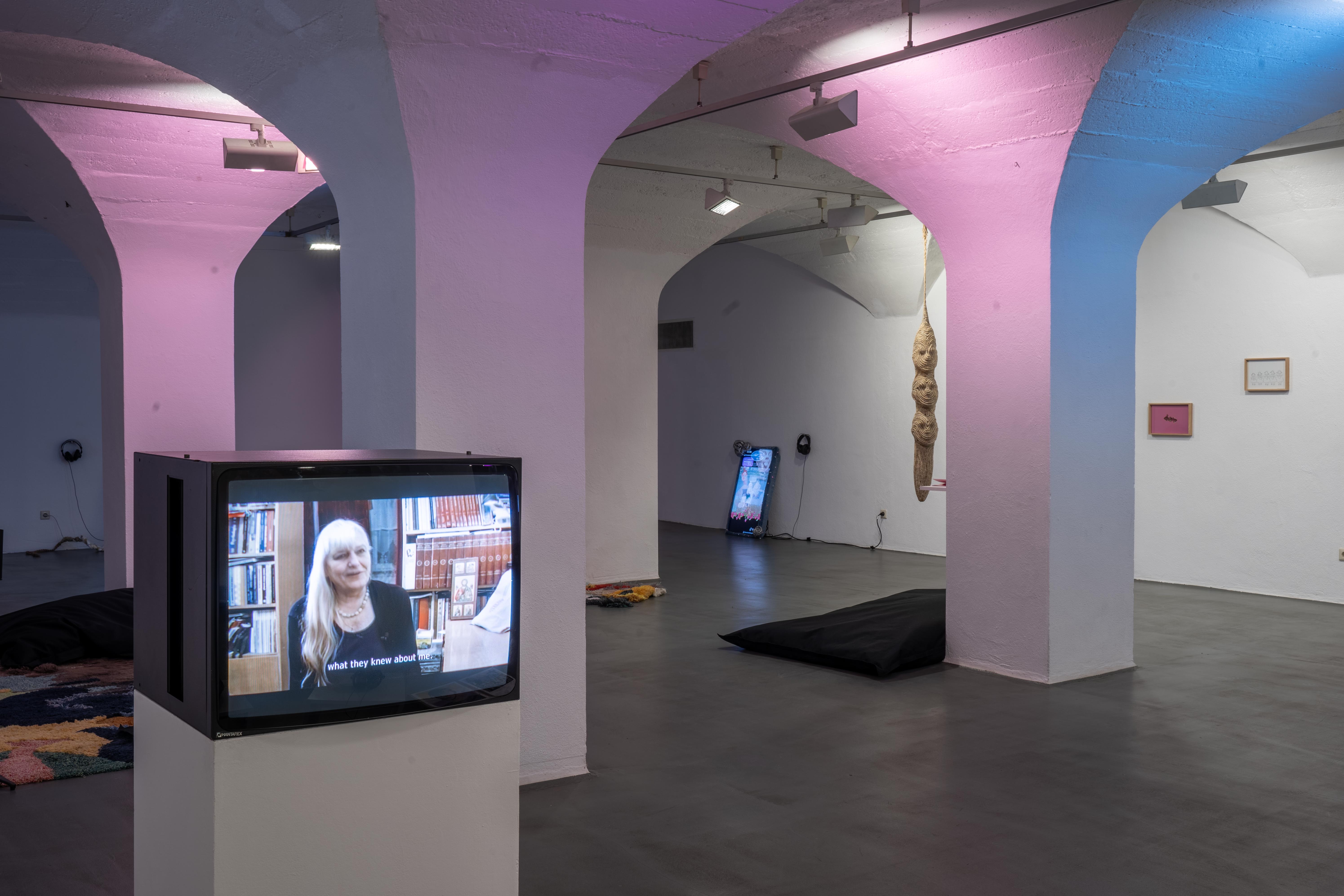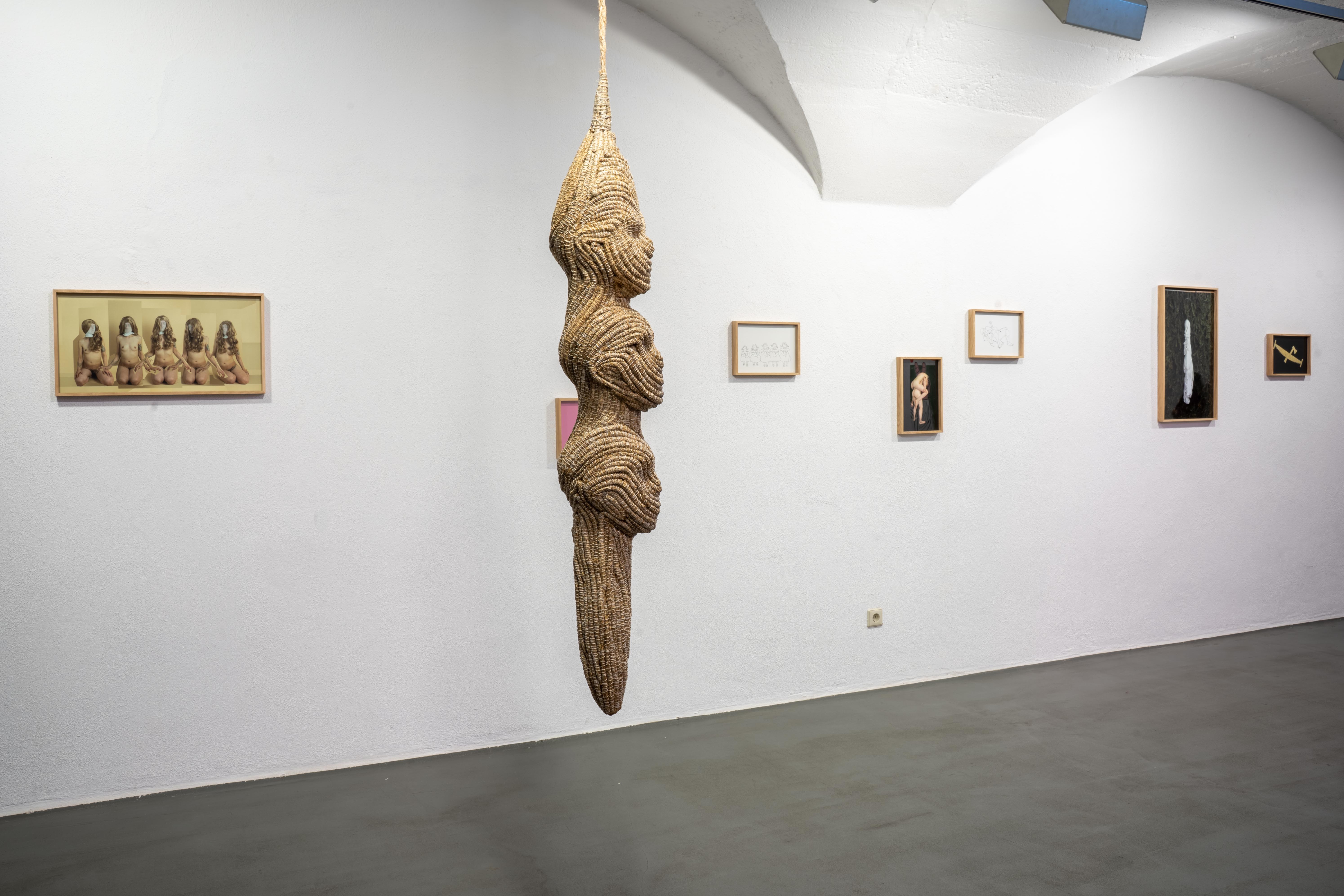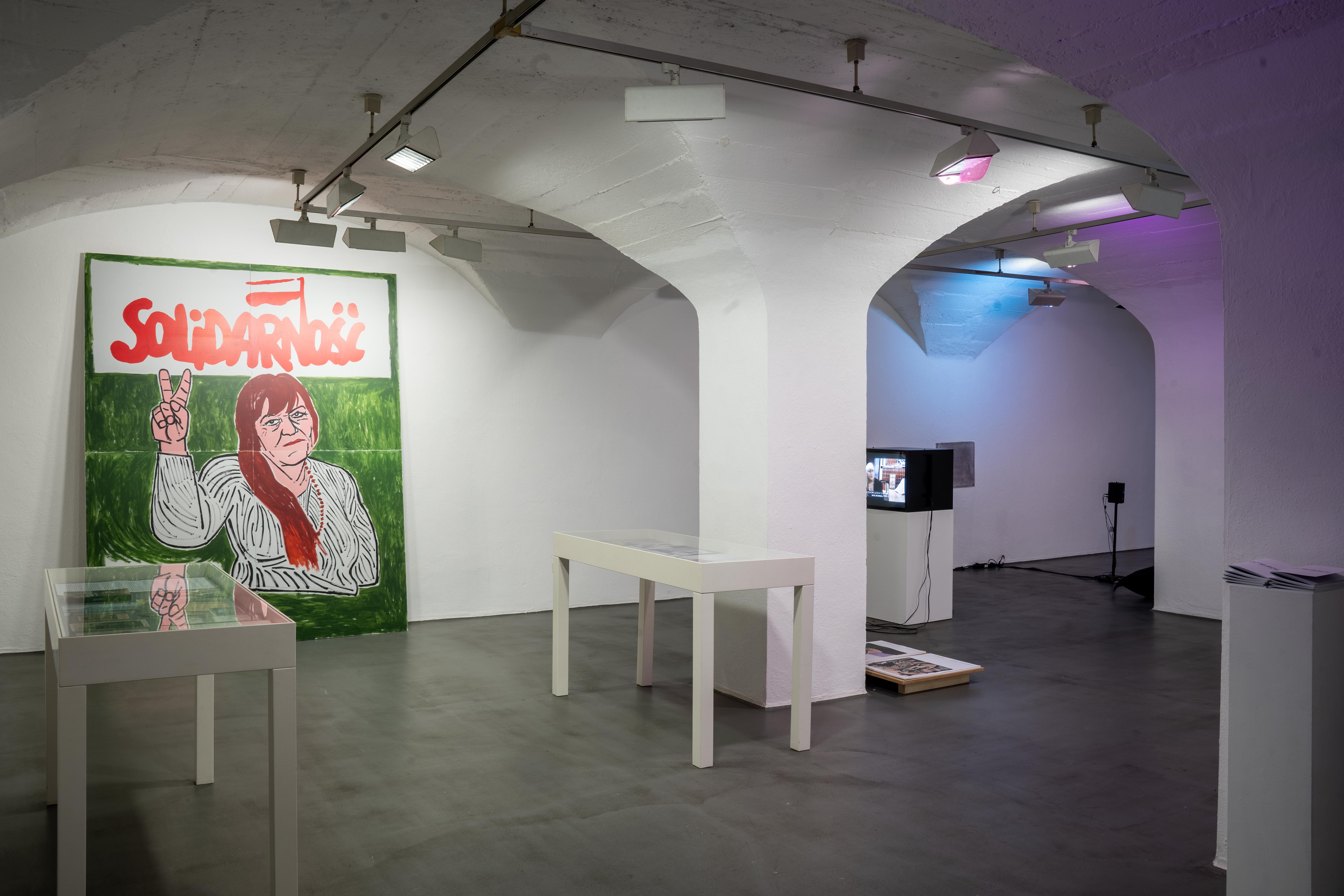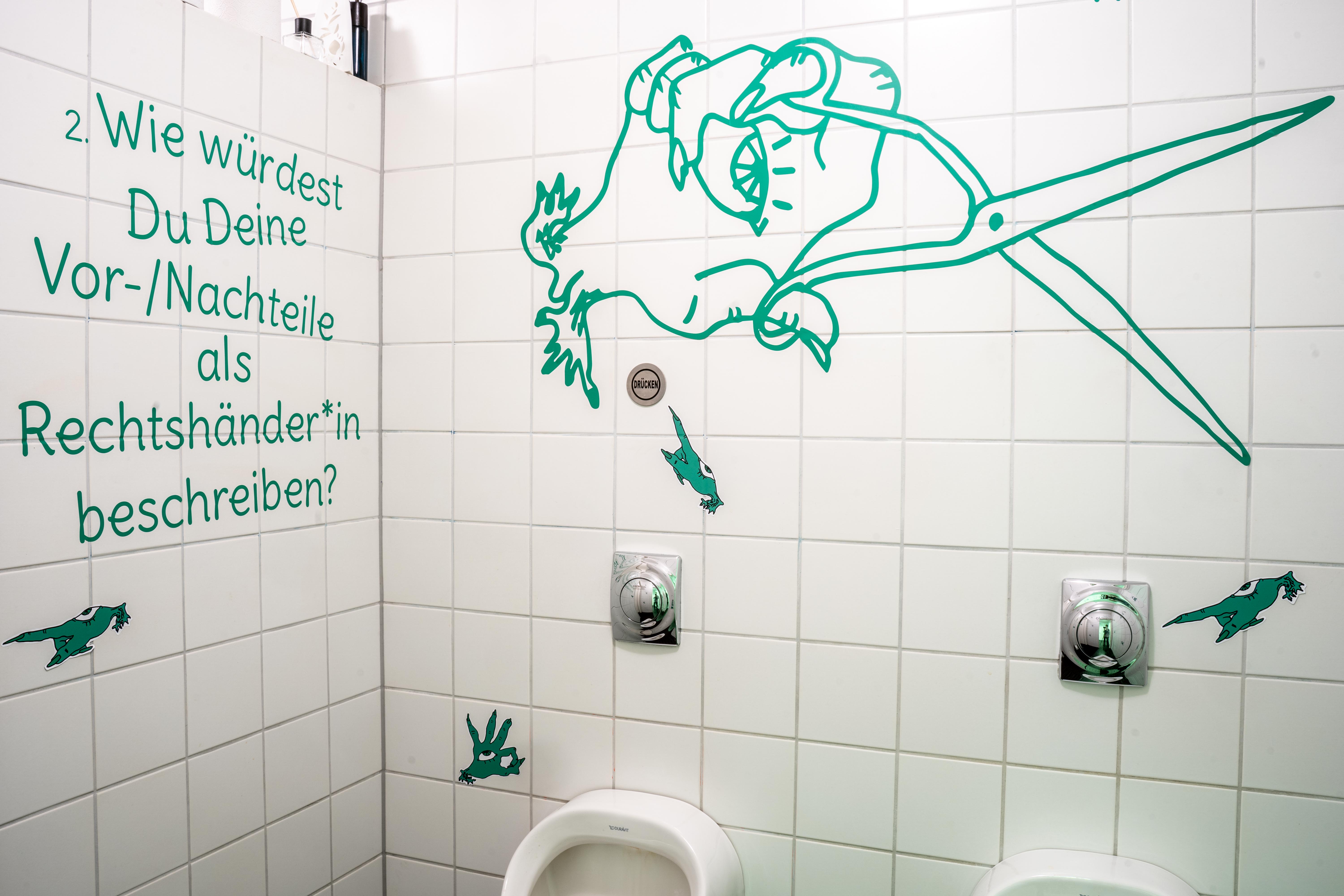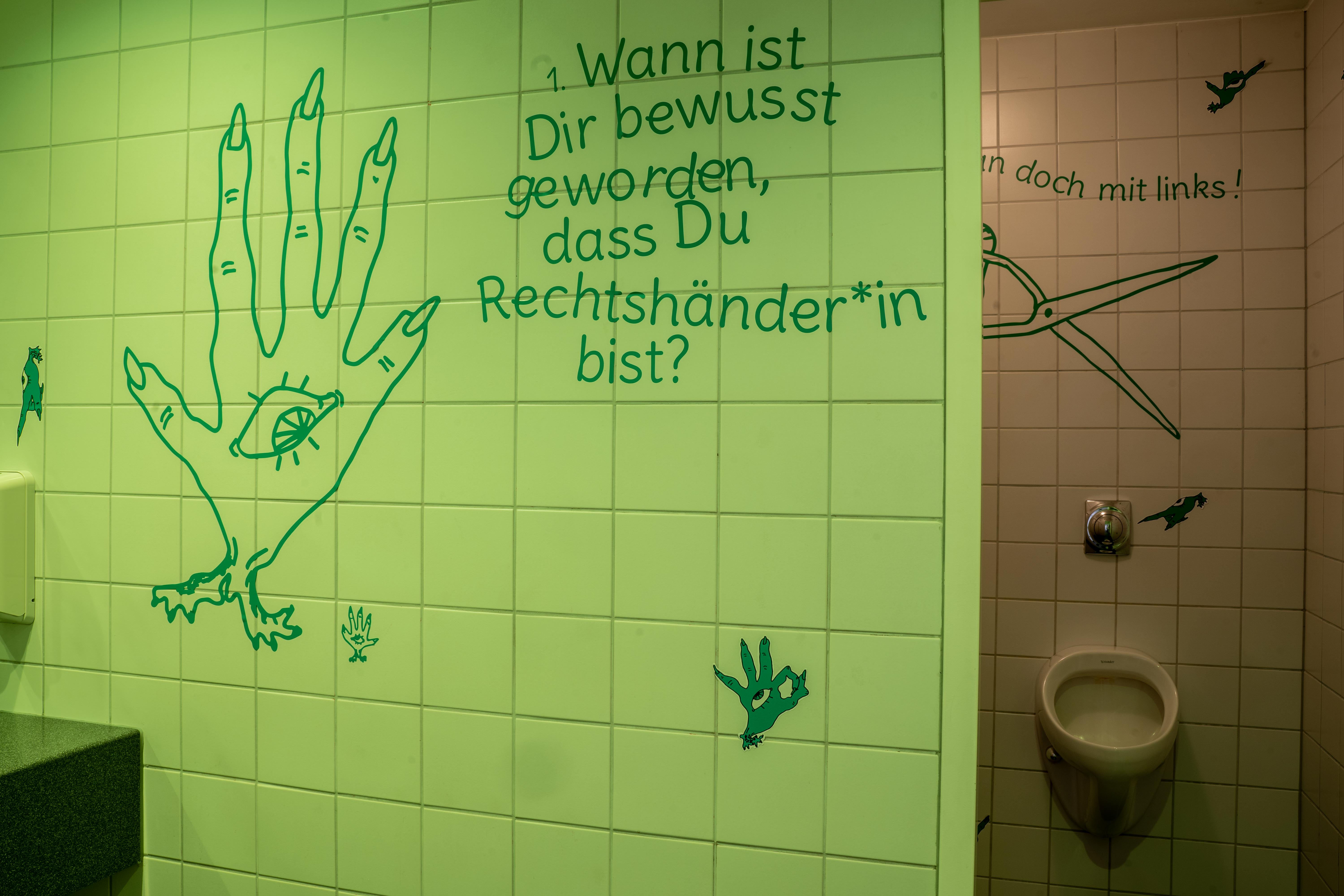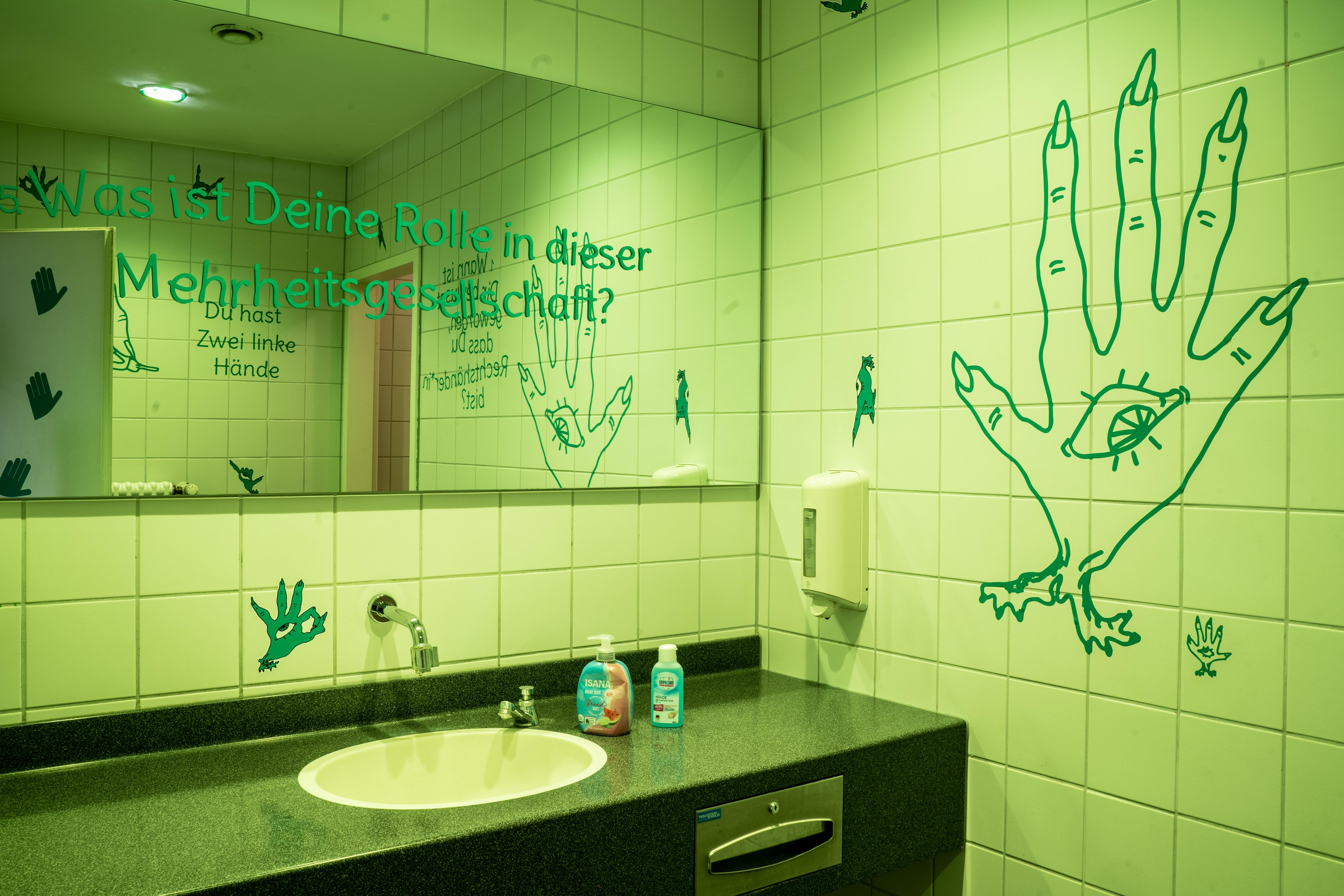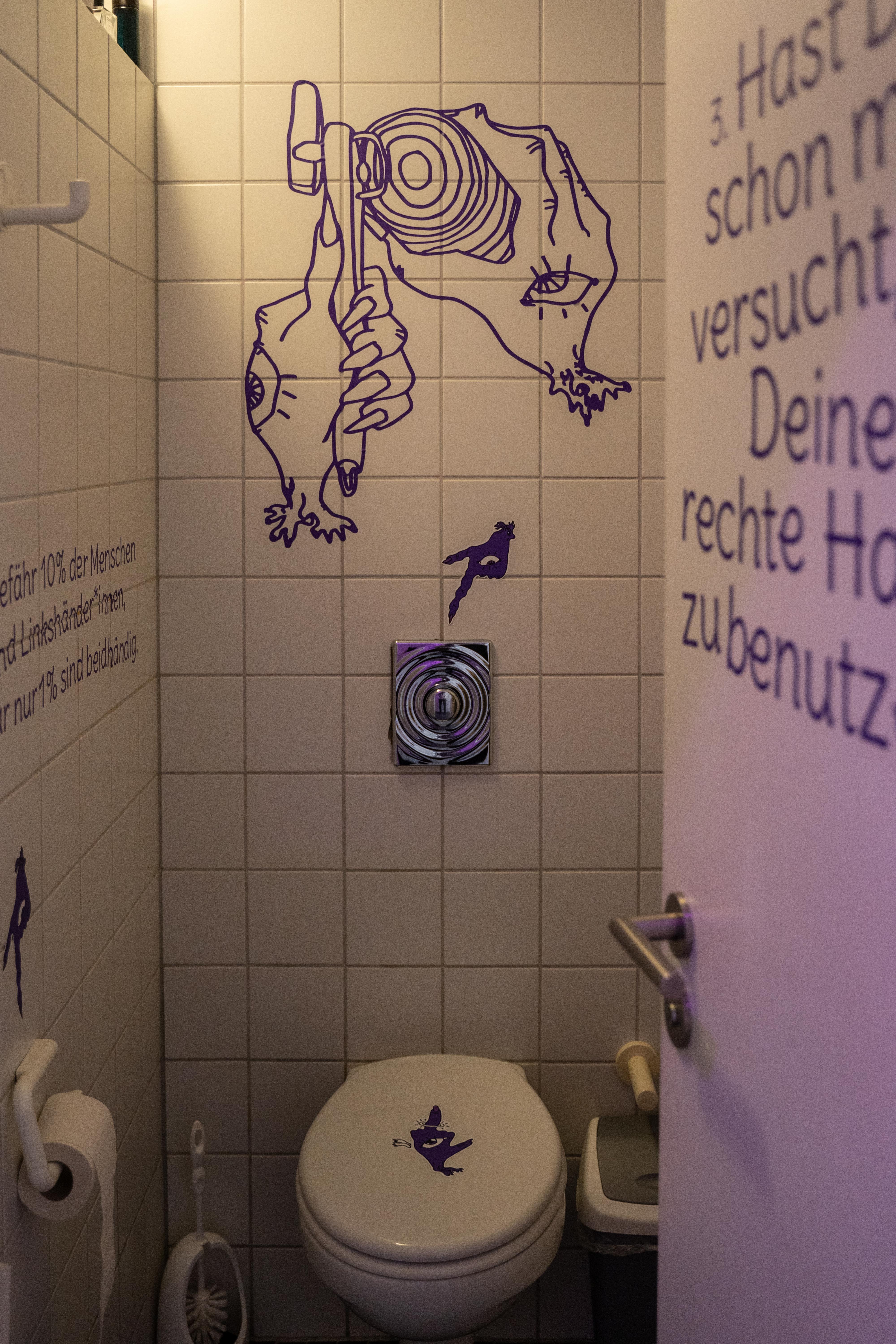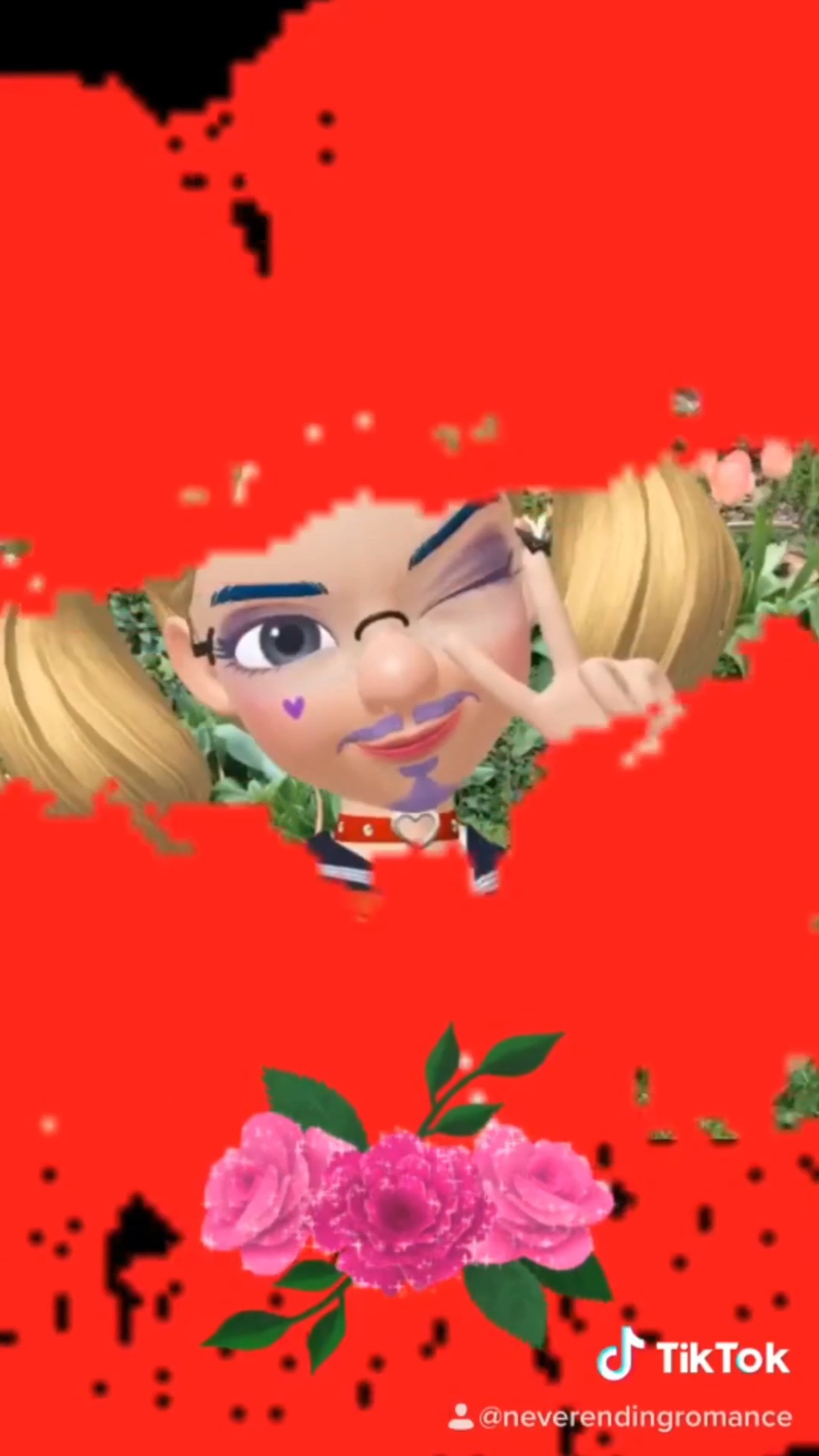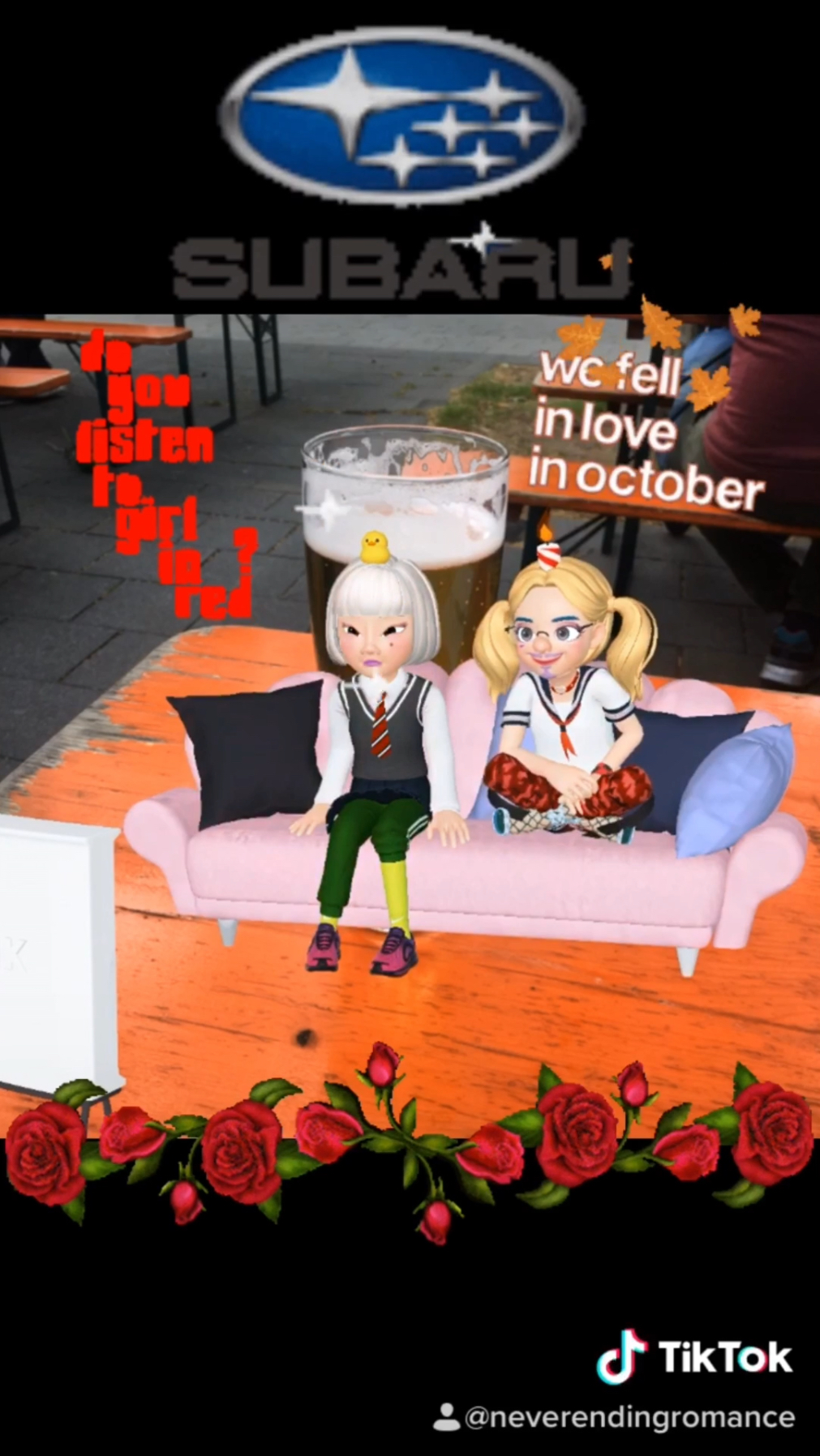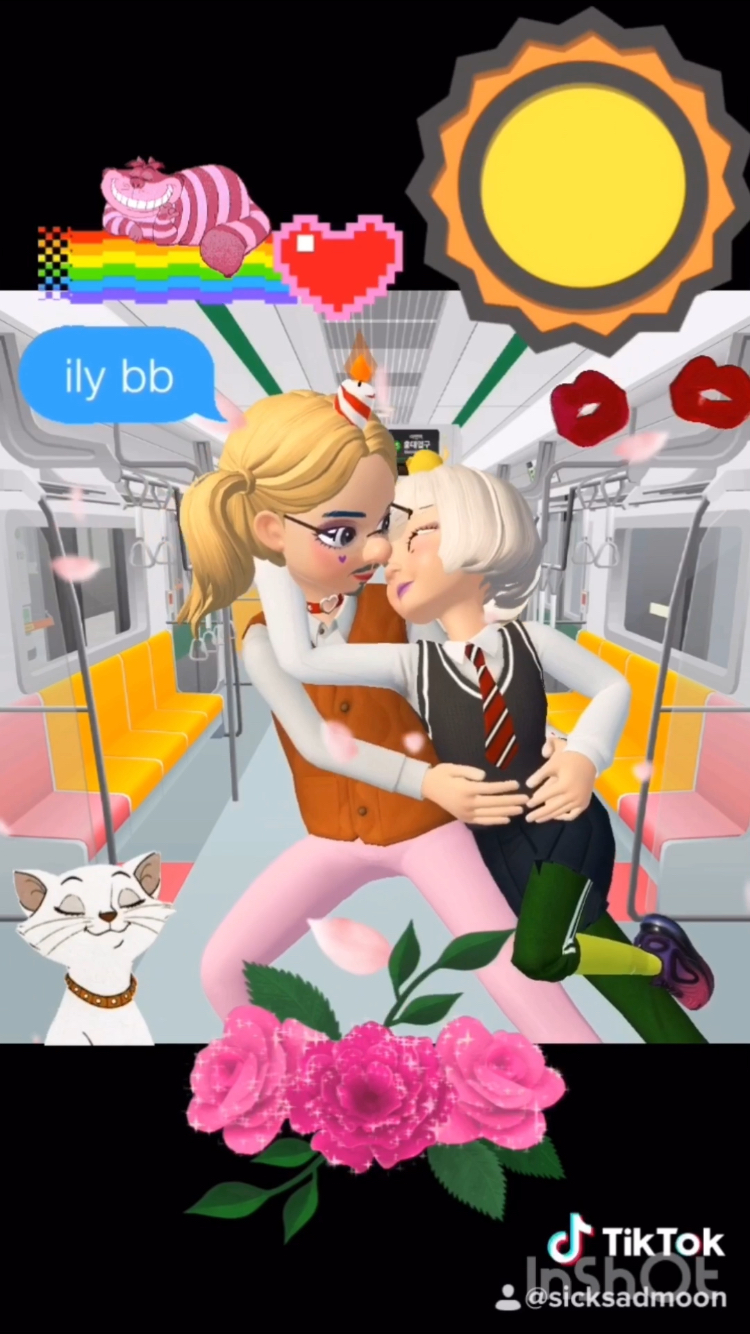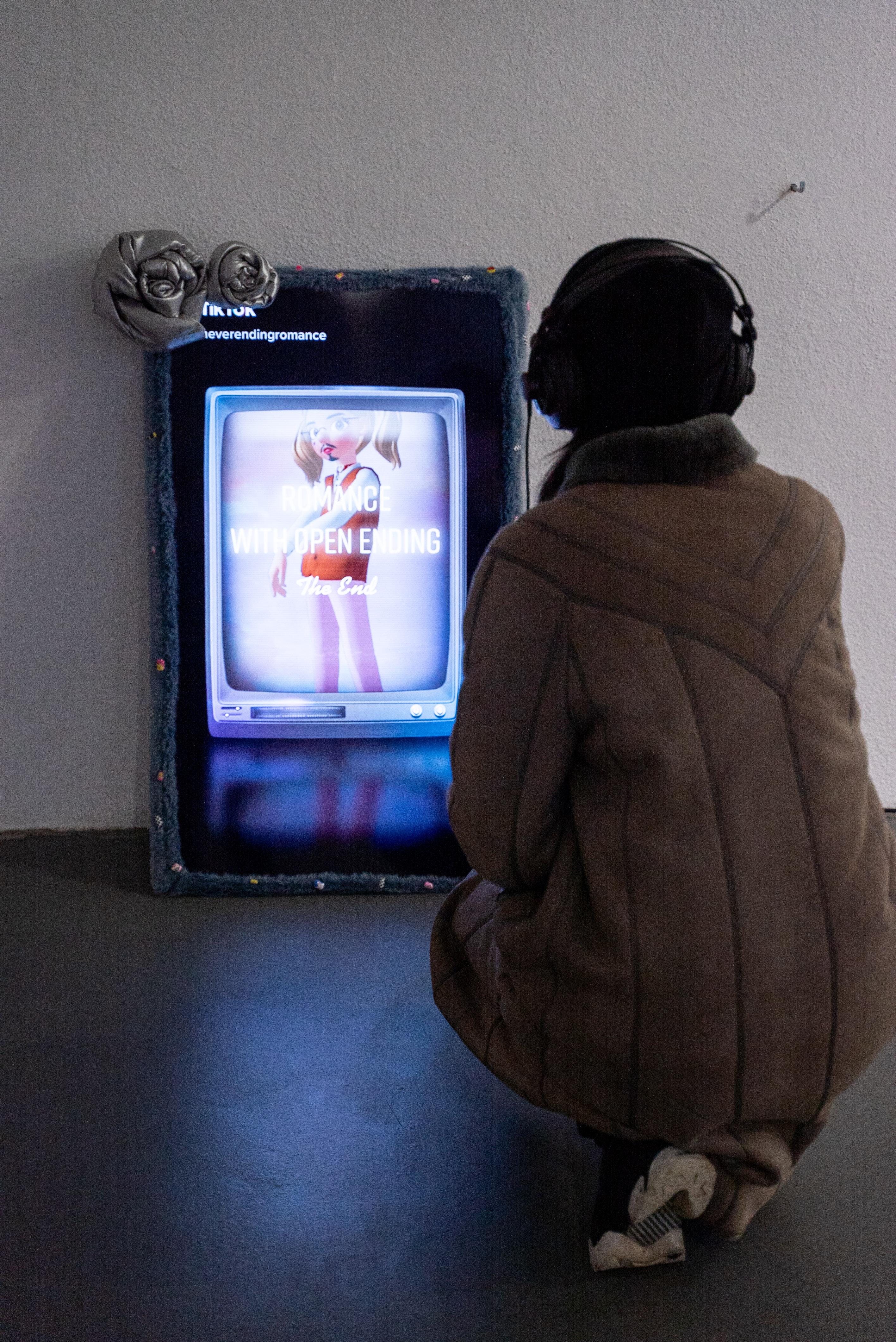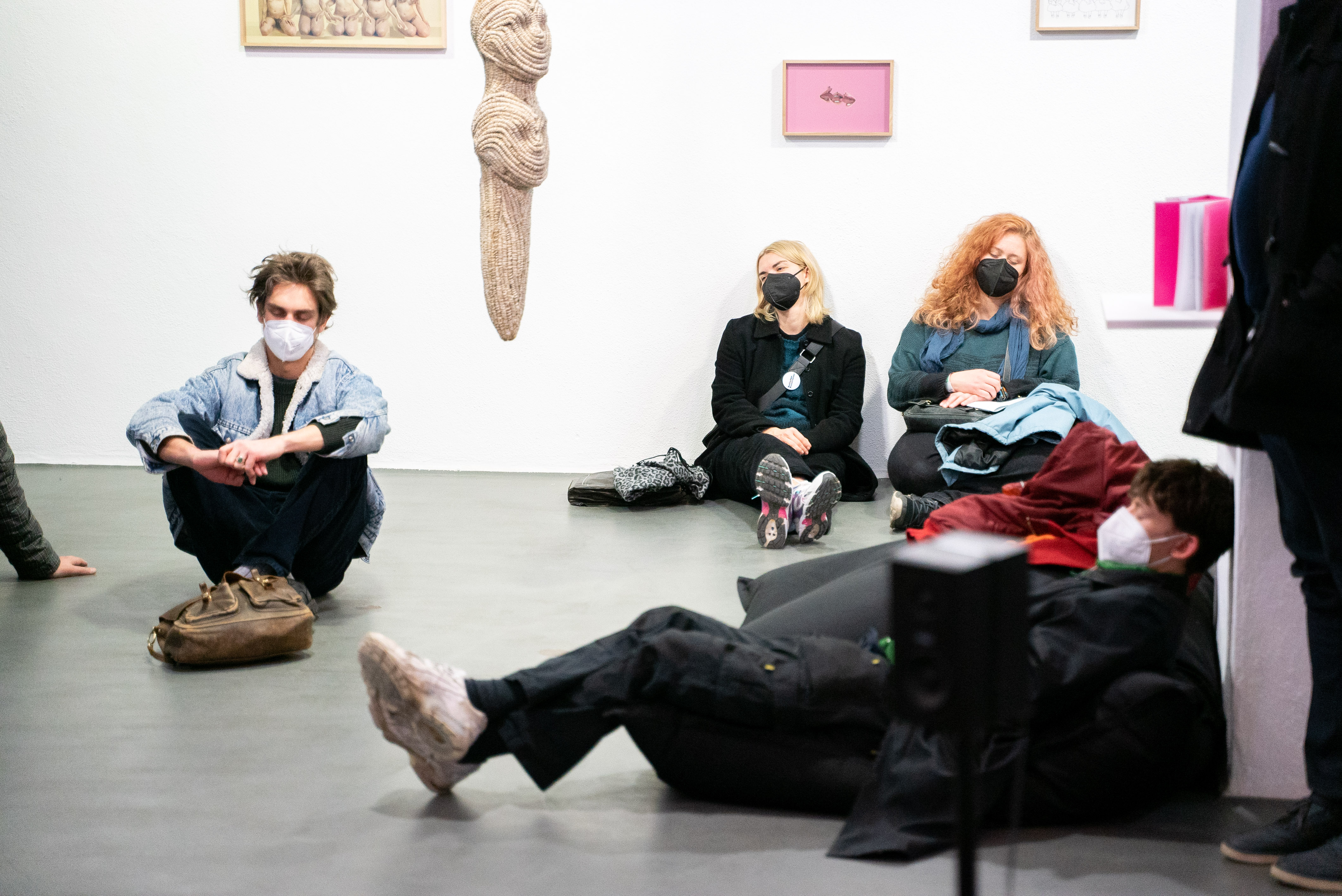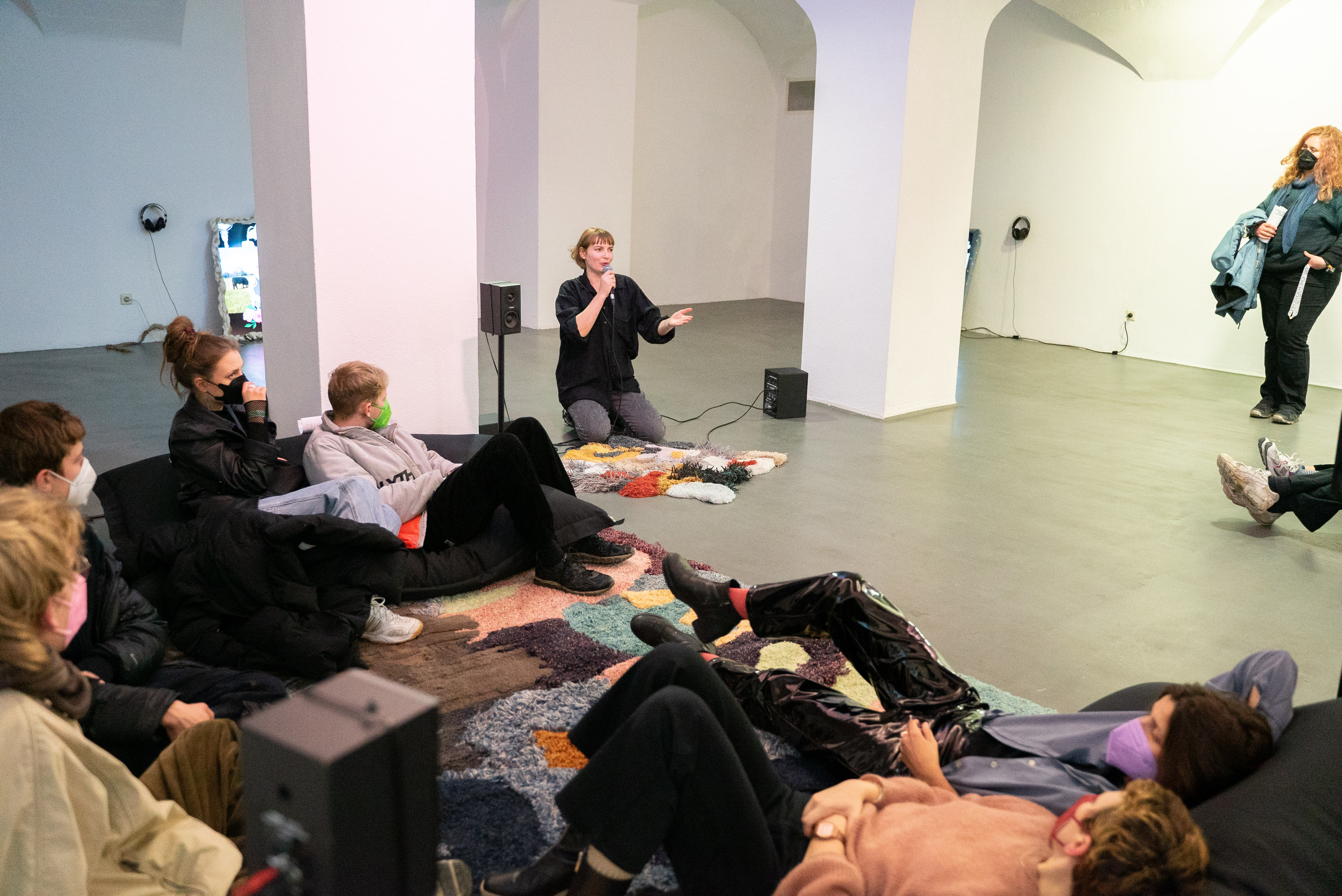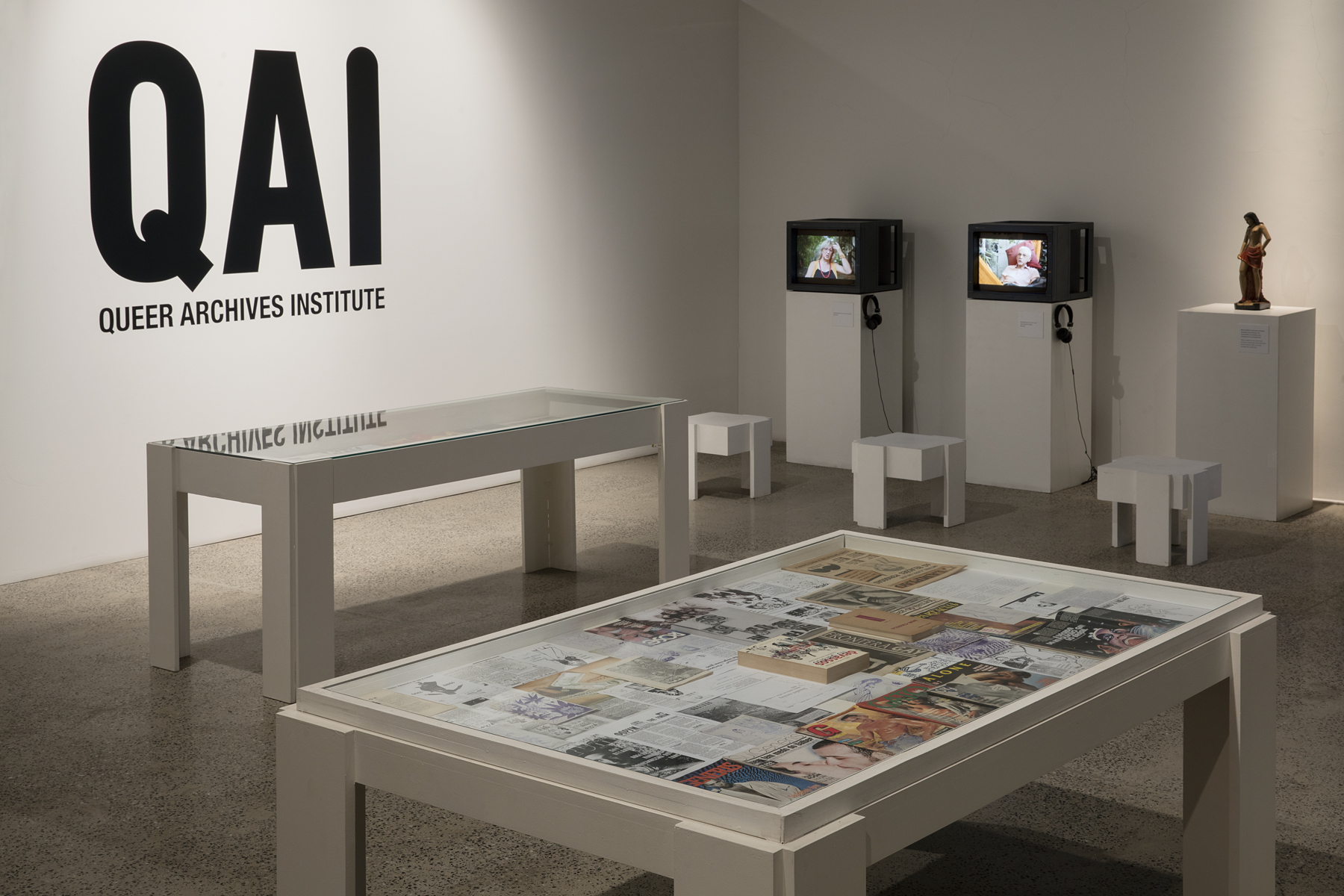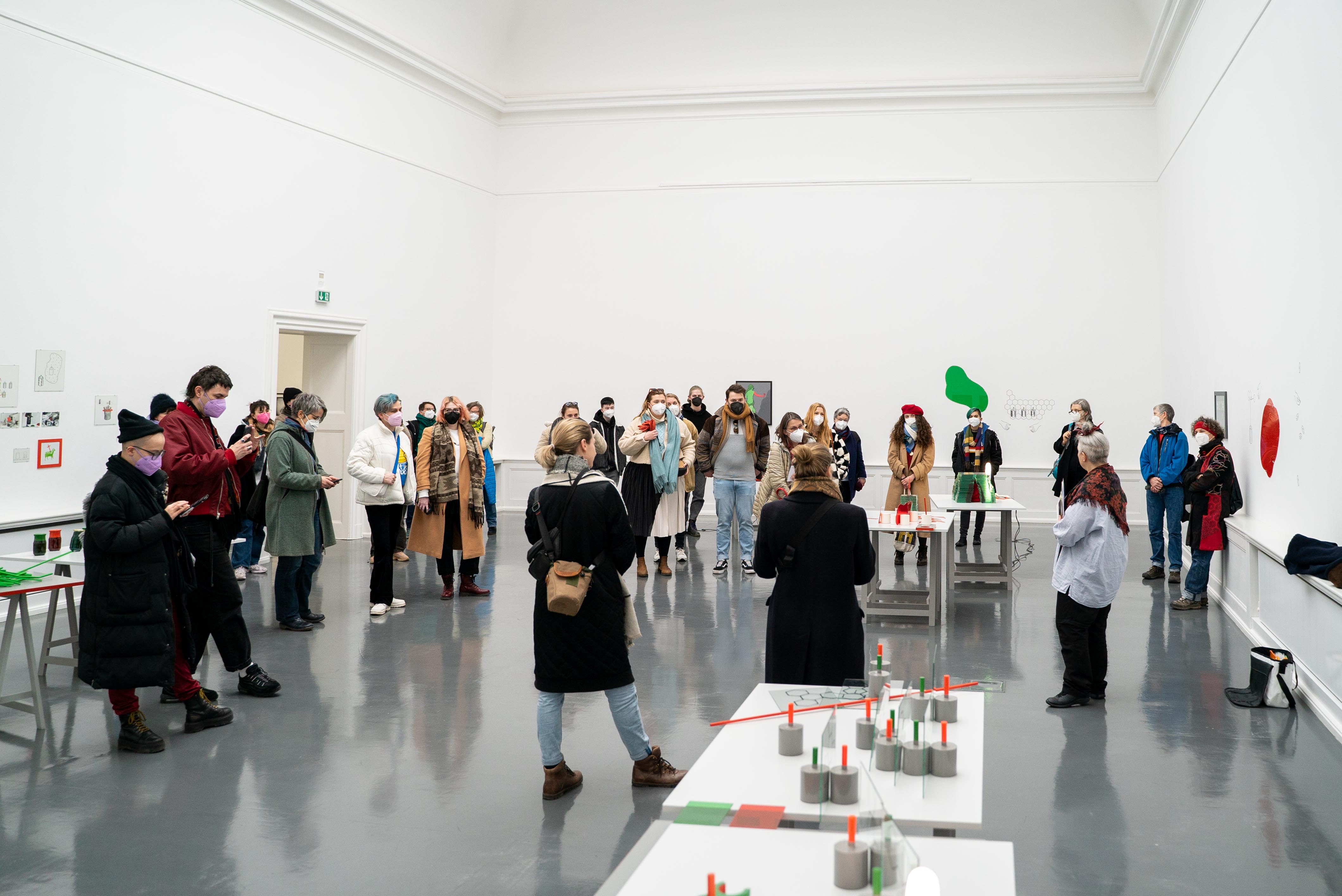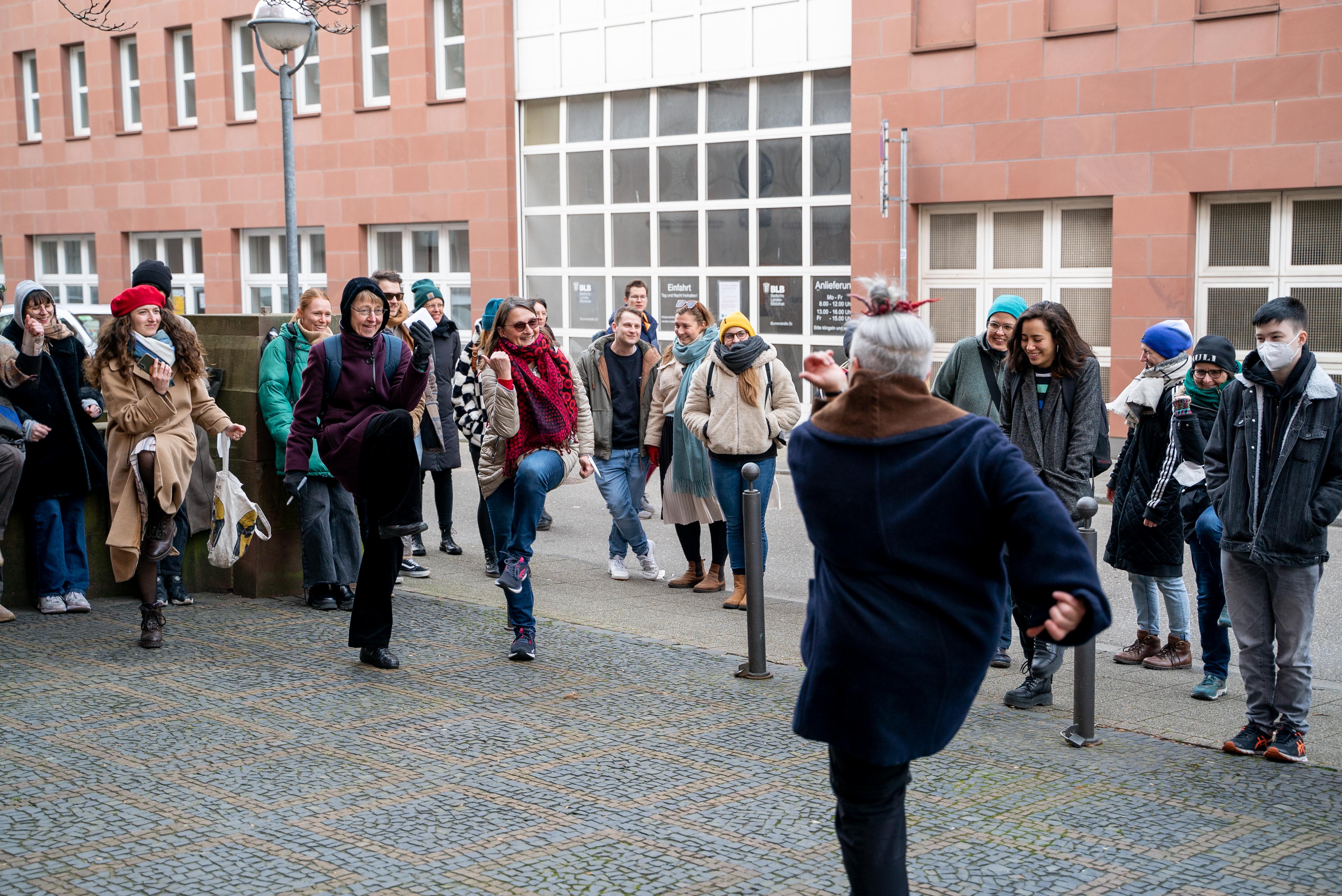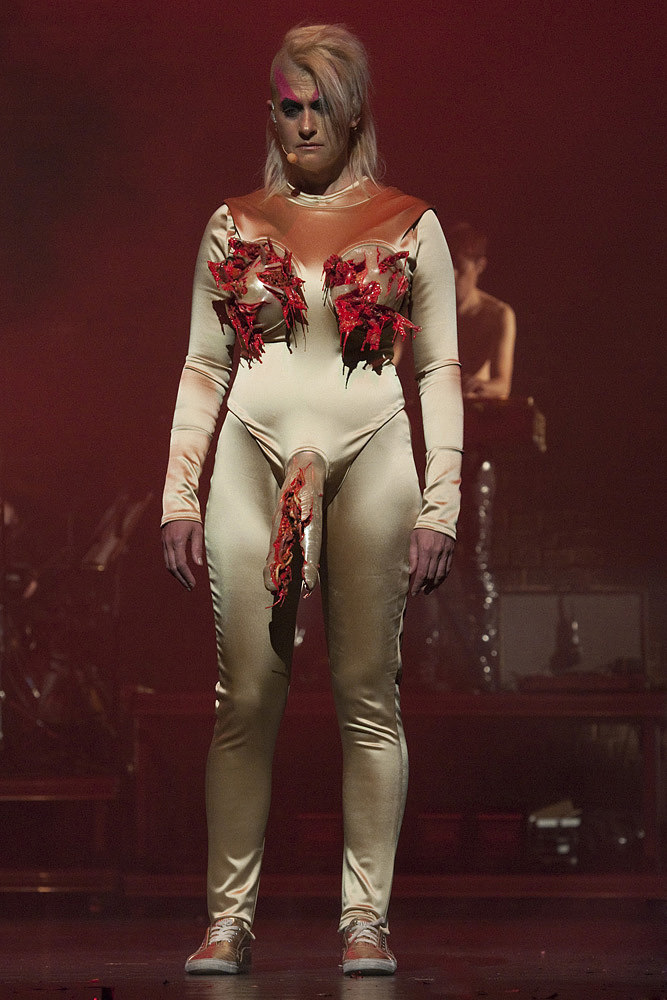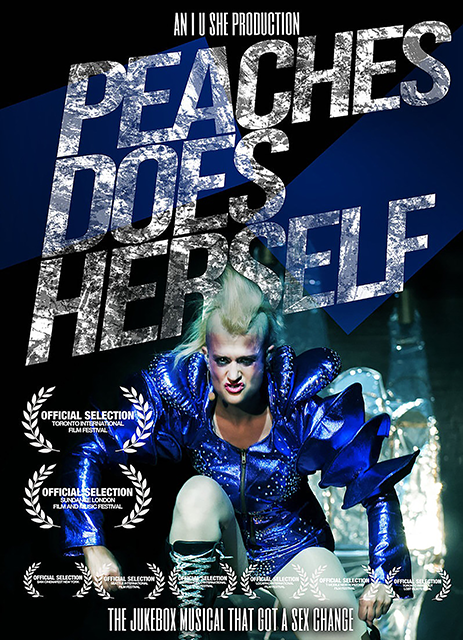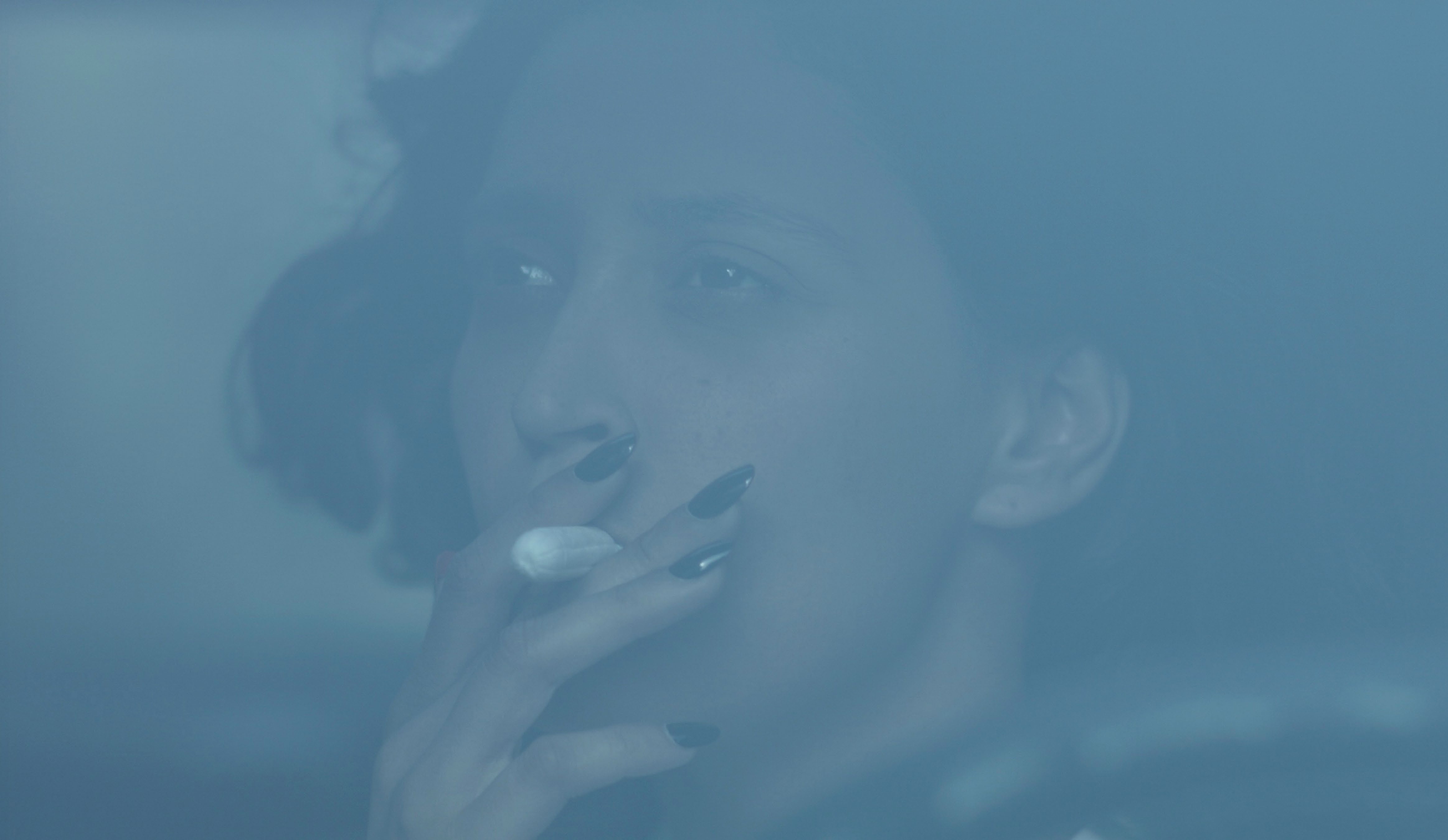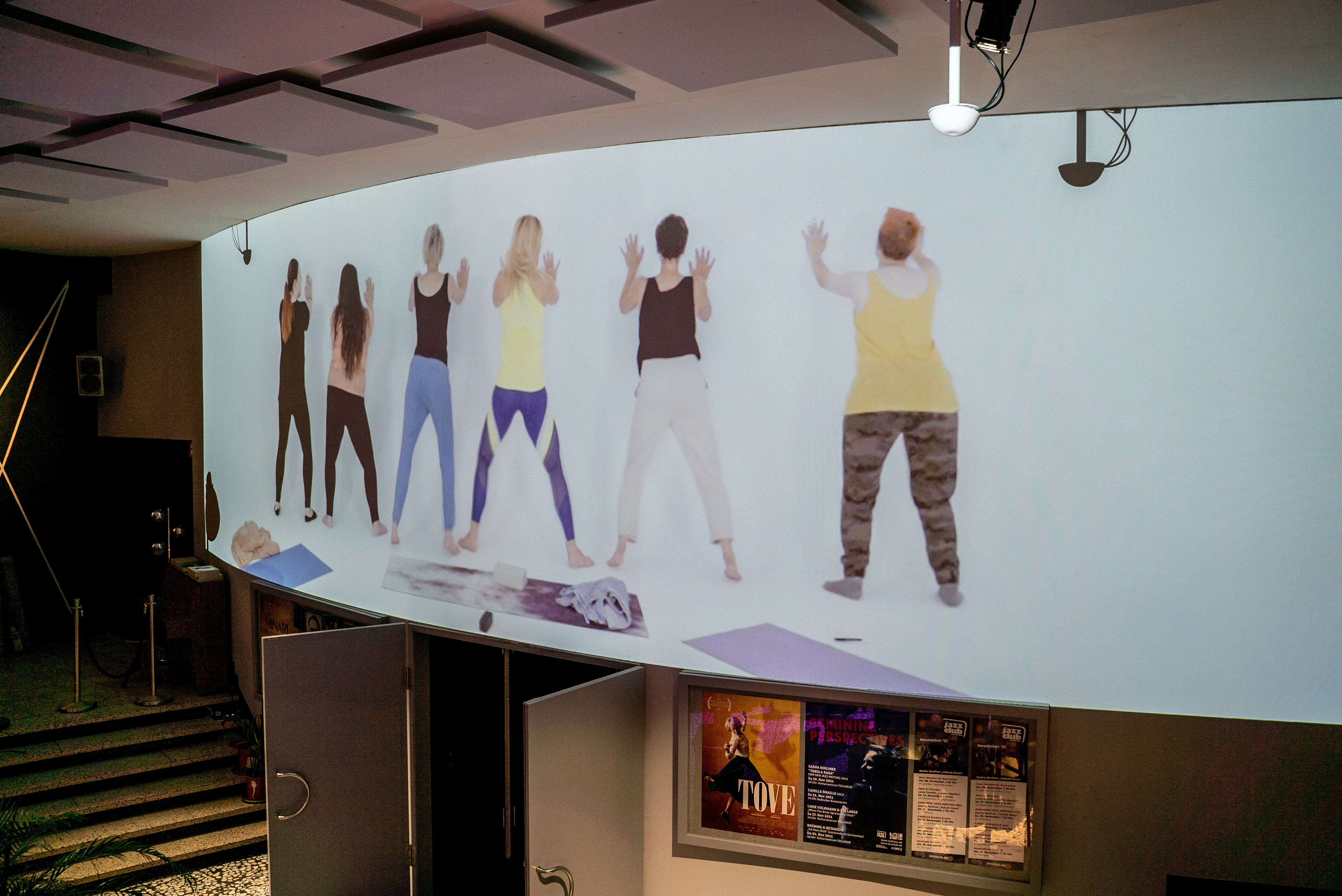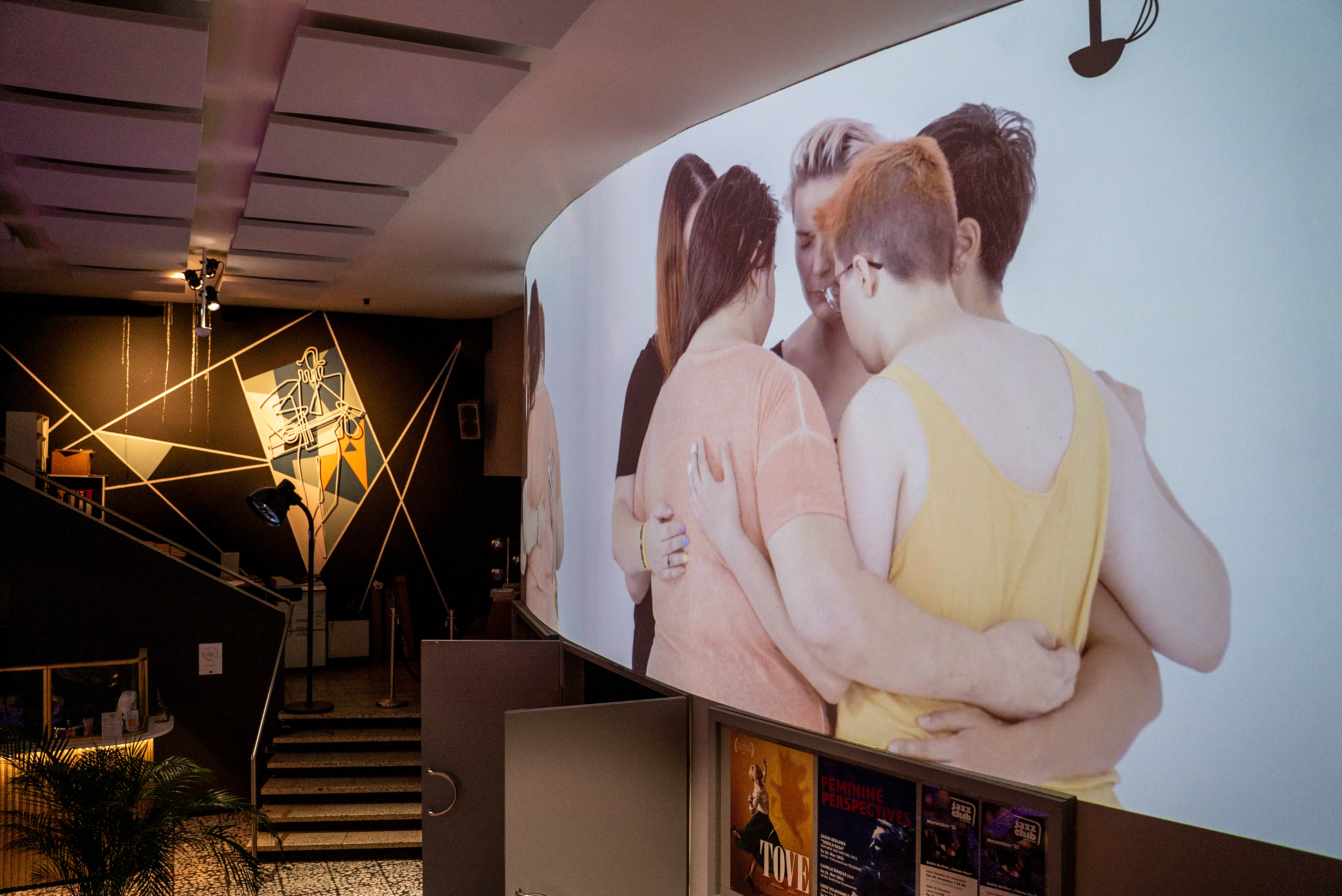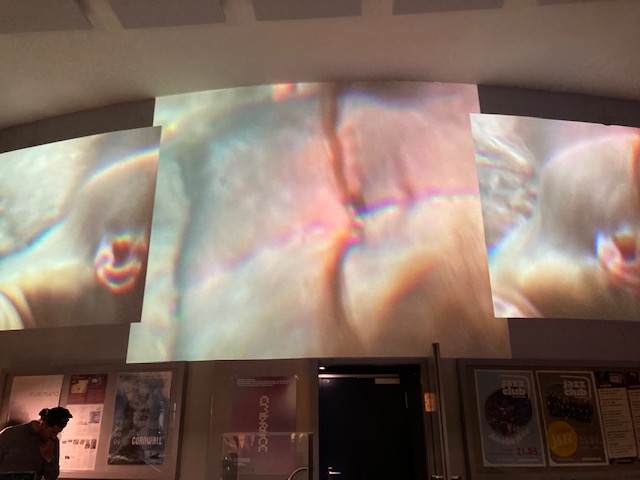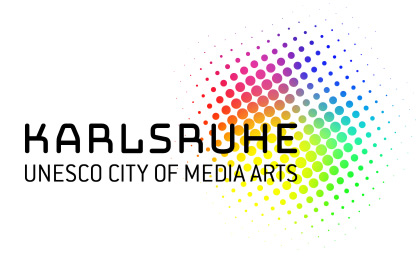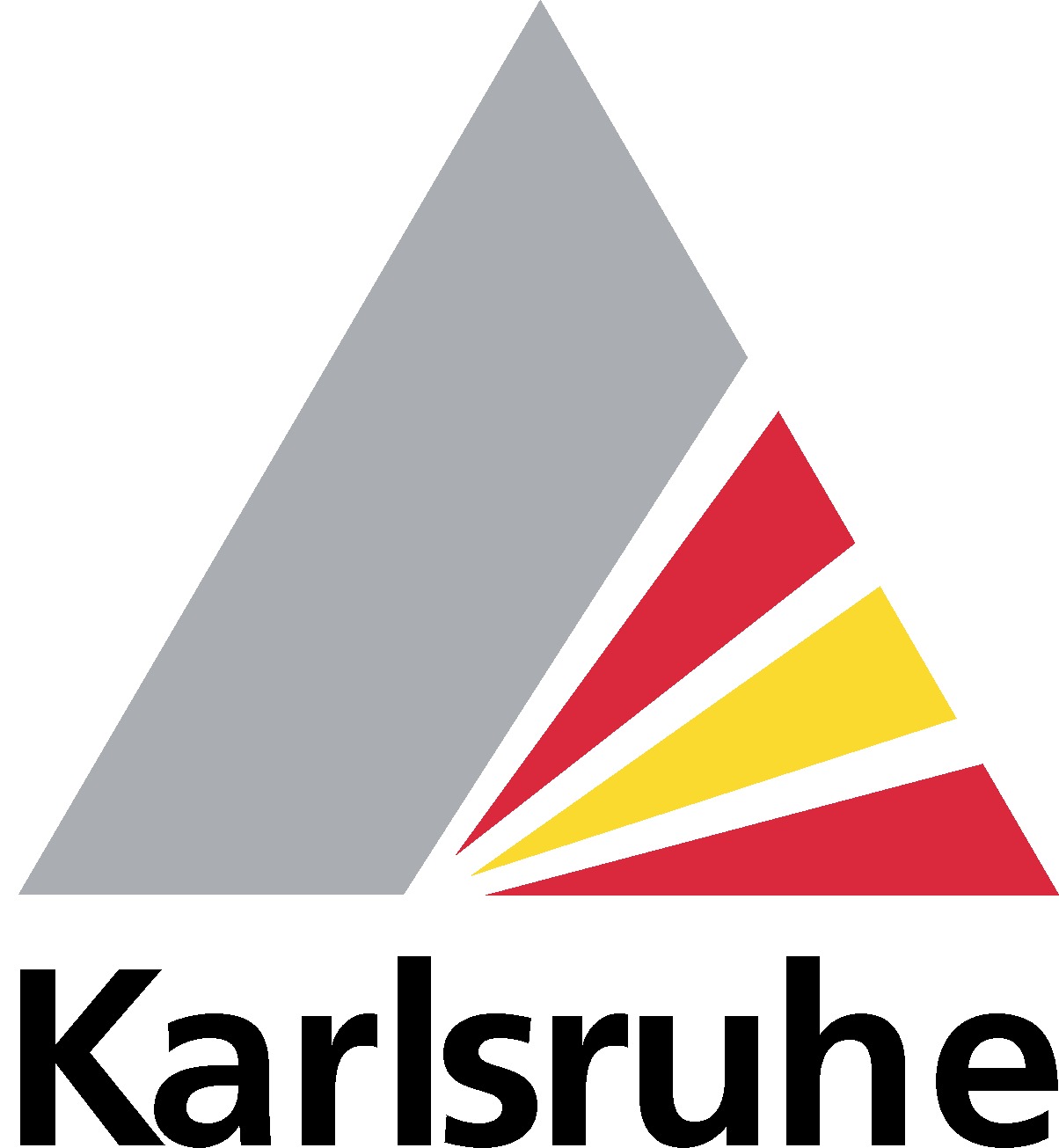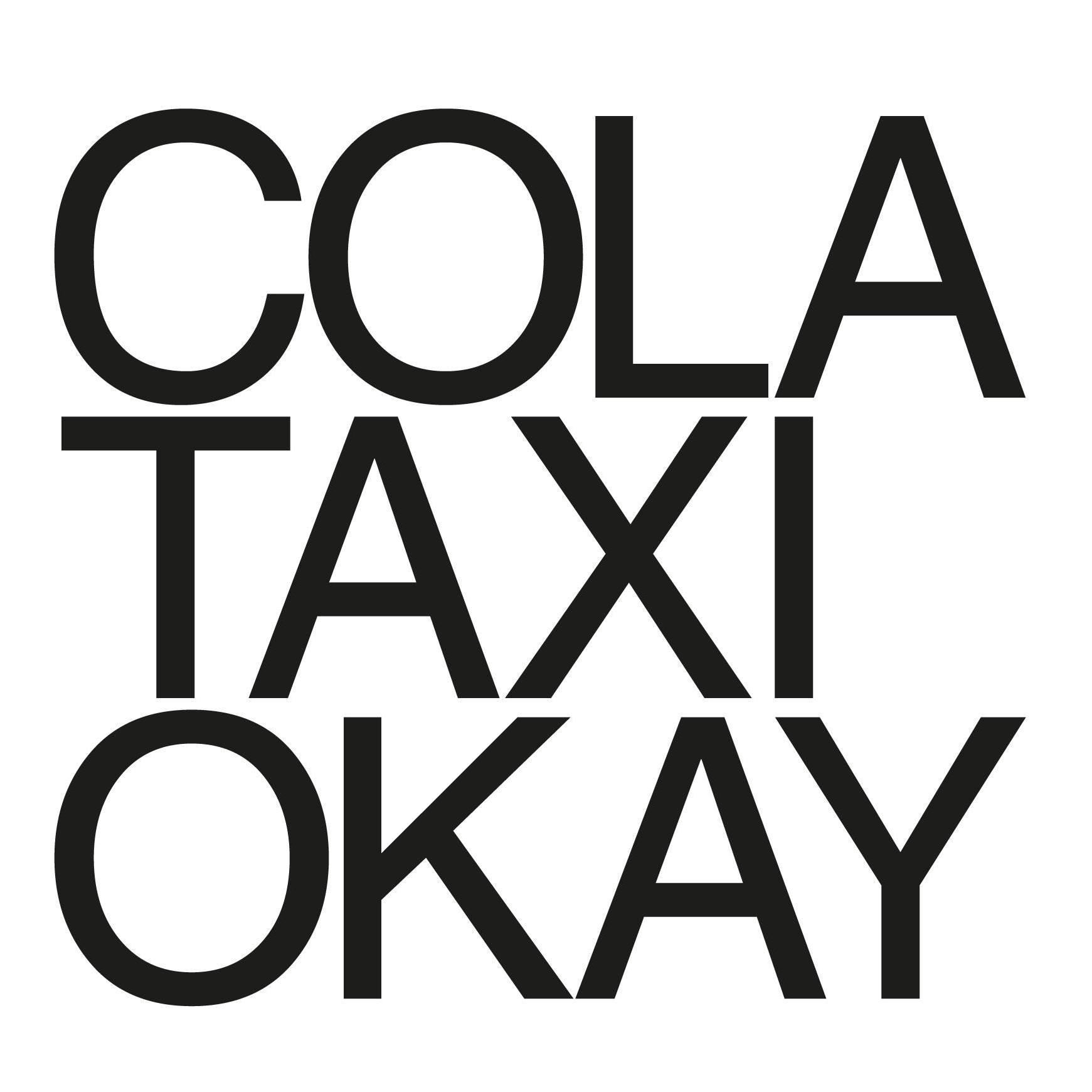Embrace is a nomadic platform for interdisciplinary cultural and artistic exchange designed to promote both national and international cooperation. The Embrace Platform, established in 2020 by Karolina Sobel and Kerstin Möller, brings together a multiplicity of medial art forms, including video, photography, sound installations, performances, and workshops. The exhibition Embrace advocates gender equality and the normalization of non-binary gender identities in Germany, Poland, and Europe. The emphasis is on artistic exchange on the topics of LGBTQIA+ and women’s rights, as well as on forms of nonviolent resistance.
As its premiere project, the platform has organized an exhibition for the Badischer Kunstverein featuring invited Polish artists and artists with biographical connections to Karlsruhe. The contributions of Liliana Zeic and Karol Radziszewski & Queer Archives Institute investigate perspectives for queer historiography in Poland. Zeic explores the history of non-normative women in Poland with reference to a portrait of Narcyza Żmichowska, the first Polish novelist to thematize love and passion between women. Karol Radziszewski provides insights into the Queer Archives Institute, an institution founded by the artist, and an alternative archive for queer sources from Central and Eastern Europe. Together with workshop participants, Edka Jarząb elaborates an audio-manifesto, a report of how we feel as a group and as individuals, that seeks to come to terms with the concept of the 'safe space'. Explored in this framework are the ways in which normative, dominant models complicate everyday struggles of queerness and femmehood, high sensitivity, of having different goals and needs than dominant models and ideologies projects on us. Mara Ittel and Charlotte Eifler, two of the jury-selected artists with biographical connections to Karlsruhe, address the issue of post-digital worlds from queer or feminist perspectives. Jessica Kessler intervenes in the restrooms of the Badischer Kunstverein, critically interrogating inherent binary decisions, which she represents through the segregation of right and left-handed individuals. The exhibition also incorporates film screenings at the Kinemathek Karlsruhe, with interventions by Karolina Sobel and Kerstin Möller.
Impressions
-
Exhibition
-
Two Left HandsInstallation – Jessica Kessler
You have two left hands!" What's that supposed to mean? Well, that you fucked up pretty bad. One left hand is bad enough, but two? "I do that with my left!" Left-handed people don't have it in them at all if you believe these proverbs. But why is that? How do we perceive left-handers and right-handers and why? And above all: what does this say about us and our society?
Door 1: left. Door 2: right. Only wall in between.
Door 1: woman. Door 2: man. Between them only wall. -
Romance with Open EndingInstallation – Mara Ittel
This web series is about a throuple romance between the three characters, Cockatoo, Raven and Pegasus. Short episodes show the development of their relationship and the ups and downs of being together. The first episode was created at the beginning of the pandemic. The series was created with videos and images from Zepeto avatars and edited together in TikTok using editing presets and various filters. Through stickers, songs, and an voice over, the series draws on the trends, codes, and styles of queer online communities.
The background images are nature and landscape photographs or screenshots from the artist's personal photo archive and thus form an inconspicuous and unobtrusive biographical element. The series also reflects the yearning for love and closeness which can somehow be created artificially and virtually in social media, while at the same time the search for community as a queer person in the "real" world, especially in times of a pandemic, where most LGBTQIA+ bars had to close their doors, has become particularly difficult.
-
Space is a safe placeWorkshop & Soundinstaltion – Edka Jarzab
Edka Jarząb is inviting participants for a workshop which explores the notion of safe space. Together with the participants, Edka will shine a light on everyday struggles of queerness, femmehood, high sensitivity, and of having different goals and needs than the dominant models and ideologies that are projected onto us. How do we define safe spaces and why do we need them?
The phenomenon of our own displacement, and the process of taking space in the air for ourselves, will be addressed. How can our voices help to build up the quality of understanding, trust, and openness? We will try to come out with our expression and first of all - breathing - as a constant exchange with the world.
We will work with our bodies – voices, memories, dreams and desires. We will exercise different resonant frequencies of our speech apparatus, we will maybe even sing or use the voice as a kind of a special vehicle and examine listening as a tool for change. We will record and compose an audio-manifesto, a report of how we feel as a group and as individuals. -
Kisieland & Powidoki/AfterimagesScreening – Karol Radziszewski
Kisieland • Karol Radziszewski, 2012, 30 minutes
Ryszard Kisiel, the creator of "Filo" - one of the first gay zines in Central and Eastern Europe - opens his archive to artist Karol Radziszewski, with whom he has been working together since 2009.Powidoki/Afterimages • Karol Radziszewski, 2018, 21 minutes
"Afterimages" tells a story of a roll of film that Ryszard Kisiel accidentally exposed twice. The superimposed negative from the end of the ‘80s is the starting point for both Kisiel's personal history and a portrait of the gay scene of the late PRL. -
Queer Urban HistoryUrban Walk – Ilona Scheidle*
An urban-historical search for traces of queer life in Karlsruhe that focuses on people, social movements, female artists, everyday life, persecution, sensual delights, and much more. We will visit sites featuring (queer) feminist perspectives on LGBTQIA+*_history.
*Ilona Scheidle (MA) Freelance historian who leads the Lesbian-Gay History Workshop Rhein-Neckar. Since 1994 she organises city tours to communicate her research. She is a pioneer for an inclusive queer h*story and is one of the founders of the network LSBTTIQ Baden-Württemberg. In 2017 she established the Dyke*March Rhein-Neckar as a historical-political intervention to make lesbian herstory visible and to strengthen feminist perspectives of non-university women's studies in the discourse. With the "Network Miss Marples Sisters" she realised the "Hilde Radusch Memorial" as a feminist response to a male-centred mermorial politics at the so-called "Homodenkmal" in Berlin. She currently works as a research assistant at the "baf - bildungszentrum und archiv zur frauengeschichte baden-württemberg".
-
Peaches Does HerselfScreening – Peaches
Peaches Does Herself • 2012, 79 minutes
A retrospective anti-jukebox musical. Peaches Does Herself tells the story of a young woman who, inspired by a 65-year-old stripper, begins to make sexually forthright music. Her popularity grows and she becomes what her fans expect her to be: omni sexual in body and spirit. She falls in love with a beautiful sexual goddess, but gets her heart broken and then ventures on a path of self-discovery. Critics have described the movie as "a 'Pina' for the queer and sexually liberated crowd" and others "a great introduction to the wild, pumping, sexual world of Peaches". -
A Set of non computable Things, The pattern thieves & Feminism is a browserScreening – Charlotte Eifler
A Set of non computable Things • 2017, 21 minutes
The video work creates a fictional and surreal setting. Two trainees practice exercises of non-computability within a training camp of a visual resistance group. They test their options for a fluid concept of identities and entities – against a static understanding of representation. An algorithm constantly scores their achievements. On their way, they encounter the genre of the road movie – a white,masculine narrative. Within its images and implications, the trainees try to restrict and reinterpret their own legibility through ambiguities, imitations, and senses apart from visuality.The pattern thieves • 2021, 4 minutes
How do patterns of dominance shape our bodies and actions? Grids secure, grids order, grids categorize and evaluate. The logic of the grid is not only found in (colonial) geography, but also in digital evaluation systems. Diverse information about bodies, landscapes and situations are fed into binary systems to be classified. The thieves in the video intend to bend, deform and discard the grids - to create space for a new disorder.Feminism is a browser • 2019
A cyber entity connects with an international feminist network and questions the future of the Internet. Yeva is a fictional cyber entity and is bored despite the vastness of their webspace. They were created in the 90s by the first generation of FACES, an international network of media pioneers founded by Diana McCarty, Valie Djordjevic, and Kathy Rae Huffman. These women have been communicating for more than 20 years through an email list to support each other in the tech world. They are hackers, net activists, media artists, cyber punks and web researchers. Yeva has access to the mail archive and has raised many questions about their so-called ‚mothers‘: Who or what embodies the internet, how to produce unbiased algorithms, and above all how to create a positive virus! As the server freezes, Yeva decides to leave the webspace Rosegarden and meet their mothers in the physical world. An essayistic documentary journey begins, resulting in a feminist revision of the internet. -
Precarious Bodies & ManifestoVideo Interventions – Kerstin Möller & Karolina Sobel
Precarious Bodies • Kerstin Möller, 4 min
Kerstin Möller is a choreographer, visual and sound artist, urbanist, and performing arts producer. She holds degrees from Dartington College of Arts, England, Goldsmiths, University of London, and HfG Karlsruhe. Currently her work is concerned with extreme emotional states of urban dwellers and climate change impacts, particularly in the circumpolar Arctic and subarctic. The audio-visual work Precarious Bodies || adresses violence against women and female identifying bodies, drawing on Poland’s intended withdrawal from the Istanbul Convention on Preventing and Combating Violence against Women and Domestic Violence.Manifesto • Karolina Sobel, 4’51 min
Karolina Sobel is a Polish-German visual artist. Her interests include how social issues are represented in the public sphere (such as identity, the process of building communities, social exclusion). For her work, she seeks different modes of representation that allow her narrative to be experienced in multiple discourses. She uses different media with a documentary approach that aims to blur the line between fiction and reality. Her video intervention is an expansion of the project ‘If you are ok, I am ok’, where Sobel invited a group from Warsaw for a workshop which addresses empowerment of the spirit and liberation of the senses.
Artists
- Charlotte Eifler
- Jessica Kessler
- Mara Ittel
- Karolina Sobel
- Kerstin Möller
- Karol Radziszewski & Queer Archives Institute
- Liliana Zeic
- Edka Jarzab
A special thank you to the international arts team of the cultural office of the City of Hannover, who offered continuous financial and structural support since the summer of 2020. Likewise, a special thank you to Anja Casser, who believed in us and our project. Without your trust and support from the whole team at Badischer Kunstverein we would not be where we are today. As well, we thank the team of UNESCO city of Media Arts Karlsruhe for their support. We would like to thank Professor Susanne Kriemann and the Department of Media Art/Photography at the Staatliche Hochschule für Gestaltung (HfG) Karlsruhe for their kind support. And last but not least, a big thank you to Jörg Stegmann of HfG Karlsruhe who gave us the opportunity to develop our research around Embrace Platform into a seminar titled ‘Art, Protest, and Activism’ at HfG Karlsruhe. The work of Jessica Kessler titled ‘Two Left Hands’ is a result of this seminar.
And finally a warm thank you to the jury who agreed to support us and helped to choose the artists from the open call in which artists with a biographical connection to Karlsruhe were invited to send in potential contributions for the exhibition. The jury consisted of Anja Casser, Hanne König, and Katrin Mundt.
Copyright Images by Marta Bogdanska.
